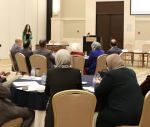You are here
Jordan’s efforts to contain COVID-19: A careful interpretation of the encouraging numbers
Apr 01,2020 - Last updated at Apr 01,2020
COVID-19 is definitely an unprecedented international public health challenge. It has been aggressively hitting cities, and many healthcare systems has collapsed or near-collapsed, wreaking havoc globally. Each country has its capacity and reacts according to its perception of threat, economy, healthcare policy and the structure of the healthcare system. The general strategies and guidelines are social distancing, testing every suspected case, treating the patients and contact tracing. Other countries are, however, taking stricter measures to contain the outbreak, such as lockdown and mass testing.
In Jordan, the dynamic of the outbreak is relatively reassuring, and it is going in the right direction. However, the outbreak is still at a relatively early stage, and it is untimely to conclude that Jordan has fully contained the virus transmission within the country. Indeed, It is hard to predict whether the disease might take a turning point. Given the limited resources and the high cost of mass testing, Jordan has taken extreme containment measures by isolating more than 5,000 expatriates, after voluntary repatriation of Jordanians, and visitors in hotels in the Dead Sea and Amman and executed the National Defence Law by forcing partial curfew. Until March 31, Jordan announced 274 cases and registered five deaths. It is no question whether Jordan needs to further extend the social distancing and lockdown or not. If Jordan prematurely stops, it might face an acceleration, increase fatality and negatively affect the economy by expanding the limits of the lockdown. As outlined by the World Health Organisation (WHO), building trust and strong community engagement are essential for successful mitigation strategies.
Jordan is currently counting on a well-gained people’s trust and public awareness, but is this enough? Actually not, officials are advised to keep pressing on the hotspots, continue testing every suspected case and contact tracing of confirmed cases. Further, healthcare policy makers are endorsed to continue giving their consistent messages: “We are not done yet”, “this is an insidious and unpredictable outbreak”, “maintain social distancing “mitigation measures are ongoing”, and “you people should do your part to make our job (government) easier”. Yes, social distancing should be maintained until a rapid, sensitive and affordable diagnostic test on a mass level comes into play. According to the European Centre for Disease Prevention and Control: “social distancing measures should remain stringent until incidence drops to a certain threshold, then relax measures before reintroducing them before the hospital capacity threshold is reached again”. De-escalation of the social distancing measures is dangerous without adopting the aforementioned strategy or until a game-changer comes: a vaccine or such test. In the current situation in Jordan, adherence to the three T’s model (Test, Treat and Trace) will help in identifying more cases to break the chain of transmission in the community and to estimate the real prevalence of the disease.
Everyone should be ready for the unexpected!
Jordan is absorbing the first impact of the COVID-19 crisis, and it needs to determine the consequences of this impact, the aftermath and future health strategies. The balance between politics, economy and health is a complex interplay. In this sense, Jordan has sacrificed the economy over saving the health care sector and people’s health. In the short term, Jordan should continue the mitigation measures to prevent an epidemic rebound and to keep preparing for the worst. Then, Jordan has also to be ready to respond effectively to a potential second wave of imported cases when the situation settles down locally if there is no international exit strategy.
Moreover, the government is advised to set up emergency plans to get extra life-saving ventilators and expedite installing mobile care facilities to respond to any sudden incident. These measures have already been announced and more organised preparation is advised. In addition, healthcare providers need local guidelines for best practices during such a crisis to standardise the health service across the country and define the priorities. Such guidelines are necessary to resolve uncertainties in providing care to patients with other serious illnesses, malignancies or emergencies. On the other hand, the government has to take serious steps to protect healthcare providers by including these measures in the guidelines and providing sufficient supply of personal protective equipment. A liaison with the industry should be prioritised to ensure sufficient supply of personal equipment and ventilators with high quality standards. For the long term, Jordan needs to consider more investment in the healthcare system in terms of infrastructure, research and training. Several scientists believe that coronavirus might re-emerge in the fall, and it might not be the last novel virus to cross our path.
Future perspectives
This crisis is teaching humanity many lessons, and all of us have to rise to the challenge: Countries need to share data, resources, experiences and expertise. Also, scientists of all disciplines must work together to inform political leaders who have to make difficult decisions based on models and incomplete data. But as time passes, the networks of scientists and the accumulation of real-world data make predictions more accurate allowing more precise informed counselling. Countries can use this pandemic as a wakeup call and usher a new, better and healthier world, and here; I would like to use one of my favourite and famous Latin mottos: “Per aspera ad astra” which means "through hardships to the stars."
The writer is Assistant Professor of Urology, School of Medicine, the University of Jordan. Visiting Professor, Department of Urology, the Medical University of Vienna, Austria. Chief Editor, Arab Journal of Urology. He contributed this article to The Jordan Times












